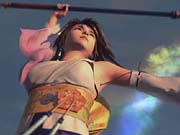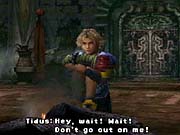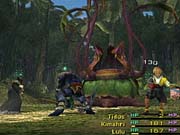Final Fantasy X
We look at Square's upcoming RPG and talk with some members of the development team.
Final Fantasy X marks a number of firsts for the respected RPG series and developer SquareSoft. The game is the first entry in the series to be released for the PlayStation 2, the first to use voice acting, and the first to experiment with the traditional Final Fantasy mold. In the first of a two-part look at the game, we'll talk with some members of the development team about working on the game. Today, we'll question producer Yoshinori Kitase, scenario writer Kazushige Nojima, and battle director Toshiro Tsuchida about their contributions to the project.

Yoshinori Kitase, Producer
Yoshinori Kitase is no stranger to the Final Fantasy series, having served as director of FFVII and FFVIII and project planner on Final Fantasy V and VI. Given the immense size of the FFX team, he served as producer on the game, overseeing and coordinating the various departments. The series' cinematic approach to storytelling, which began in earnest in FFVII on the PlayStation, is developed much further in FFX, resulting in one of the most fully realized presentations to date. We spoke to Kitase about taking the reins of one of the most anticipated RPGs on the PlayStation 2.
GameSpot: How did you approach this project? Did you feel pressure to do something new or special?
Yoshinori Kitase: At first, we drew up these plans for a different title, so I approached it feeling relatively at ease. In time, the project officially became FFX, but since I had already worked on three titles with the same staff, I was comfortable with the decision.
GS: How much of an influence was your work as the director of the previous Final Fantasy games?
YK: It wasn't particularly influential. In fact, at one point the production periods of FFIX and FFX overlapped, so we had to make sure our ideas didn't overlap those of the FFIX team.
GS: Where did you look for inspiration in developing the game? Other games? Movies?
YK: Nowhere in particular. The scenario writer wanted water to be FFX's key image, so we simply derived various ideas from that.
GS: Are you happy with how it turned out?
YK: Yes.
Kazushige Nojima, Scenario Writer
One of the biggest draws for fans of the Final Fantasy series has always been the stories told in the games. The tale told in FFX has the same grand scale as the stories in the previous Final Fantasy games, following the journey of self-discovery the lead character, Tidus, embarks on. The action is underscored a bit more this time out with the inclusion of voice acting, which adds a new dimension to the storytelling found in the game. We spoke to Kazushige Nojima, a Final Fantasy veteran who served as the scenario writer on FFVII and FFVIII, about the story told in FFX and the use of voice acting.

GS: Were there any elements of the story that you wanted to make sure stood out to players?
Kazushige Nojima: The theme is "becoming an independent individual," but there is much more to it than that. I'd like players to enjoy the game without being too conscious of the theme, and to interpret the overall experience in their own way. GS: Did the new addition of voice acting affect how the story developed?
KN: I was able to express emotion more powerfully than ever before. Because of this, I was able to keep the storyline simple.
GS: Did the voice acting bring out something in the story you hadn't expected?
KN: The story itself did not change, but during the recording process, I began adjusting the script to match the voice actors' personalities. This helped unify the voices to the characters. That was a new experience for me.
GS: Did the voices match how you thought the characters would sound?
KN: We held several auditions, so yes, they turned out just as I had envisioned.
GS: Did the addition of voice affect your ability to work on the story once development was under way?
KN: We were on a tight recording schedule, so I finished a lot sooner than usual. [laughs]
Toshiro Tsuchida, Battle Director
Unlike Nojima and Kitase, battle director Toshiro Tsuchida is new to the Final Fantasy series. His experience as director of the Front Mission series influenced his contribution to the battle system in FFX and led to one of the game's biggest departures from the past. FFX does away with the "active time battle" system fans have become accustomed to in the series and brings back turn-based combat. Battles are much more strategy-oriented in FFX and encourage you to plan carefully. Another new feature in the game can be seen in the new summon system, which allows your summoned creature to fight alongside you in the party once it's been called. We spoke to Tsuchida about developing the battle system in FFX.

GS: What led you to change the combat system in FFX back to its turn-based roots?
Toshiro Tsuchida: The job systems in most installments after FFV were shaped like a "V," letting players branch out their characters' abilities however they saw fit. That kind of freedom is a lot of fun when it comes to character development, but we thought we could make combat more interesting by defining each character's job, thus forcing players to formulate group tactics. We also added new features that were never present in conventional job systems, like letting players switch characters in and out of battle at will.
GS: What was the thinking behind changing the way summons worked in FFX?
TT: In the past, summons were simply handled like a special kind of spell. This time, summoners and their aeons are the focus of the story, so we wanted to give them a bigger role in the battle system, too. Mr. Takai, our effects designer, even choreographed the summoning sequences to emphasize the relationship between Yuna and her aeons. I think it all meshed quite well with FFX's story.
GS: Are you happy with the way it turned out?
TT: I am completely satisfied because the aeons are called through the most spectacular summoning sequences in any Final Fantasy game, and they then stay on the battlefield and fight like regular party members. We had to use fewer aeons than in previous installments due to issues during development, but I don't think the quality of the final product suffered for it.
GS: What are you proudest of in the combat in FFX?
TT: The battle system requires tactical thinking while also allowing a high degree of freedom in character development. I'm really proud of the balance we have reached--even players who play mainly for the story can have fun fighting because the combat system is so tightly integrated with the story.
GS: What do you think is the most important element in a combat engine?
TT: Pacing the combat is the most important thing to me. Even with the vast amount of motion-captured movement of both monsters and PCs, the players can give a command to one character, then immediately give a command to another. They can also switch characters in and out whenever they want, and these kinds of things take a lot of stress out of combat. Getting these basics right is crucial because the player will have to fight so many times throughout the game.
GS: What do you think is the best combat engine you've seen?
TT: As far as the Final Fantasy series goes, I think the FFV system is the best.
Final Fantasy X ships on December 26 for the PlayStation 2. Check back for our next look at the game next Friday.
Got a news tip or want to contact us directly? Email news@gamespot.com
Join the conversation